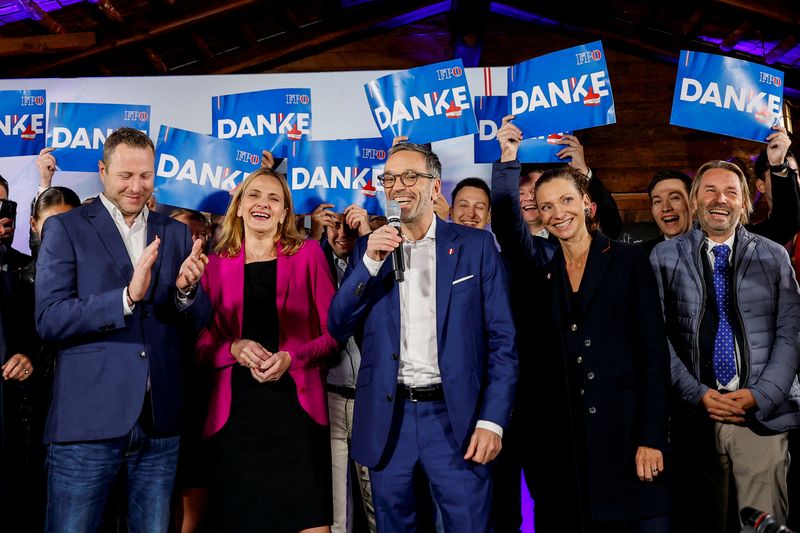Austrian far right seeks path to power through rivals’ blockade
2024.09.29 21:12
By Francois Murphy
VIENNA (Reuters) – Austria’s far-right Freedom Party (FPO) must on Monday seek to clear a path to power after its historic parliamentary election victory left the anti-establishment outfit needing a partner to form a governing coalition.
The triumph of the Eurosceptic, Russia-friendly FPO on Sunday was another milestone in the recent rise of Europe’s hard right. But the party immediately suffered a stiff reality check.
Facing FPO party leader Herbert Kickl in a television studio after results came in, leaders of the other parties in parliament dismissed his overtures on forming a coalition.
The FPO finished around 2.5 percentage points ahead of Chancellor Karl Nehammer’s conservative People’s Party (OVP) to capture some 29% of the vote – its best result ever – and Kickl accused his rivals of opposing the will of the people.
“Tomorrow there will be a blue Monday and then we will set about turning that 29% into a political reality in this country,” Kickl told supporters on Sunday evening, playing on the fact blue is the colour associated with his party.
Kickl, a provocative and polarising figure allied with Hungarian premier Viktor Orban, offered to negotiate with all other parties in Austria, whose electoral system means parties mostly govern in coalition.
President Alexander Van der Bellen, a former Greens leader who oversees the formation of governments, urged all parties to hold talks with each other and suggested the process could take even longer than the two or three months Austrians are used to.
The FPO won by more than opinion polls had suggested, but it risks being a hollow triumph if Kickl cannot find a willing coalition partner.
Still, it cheered hard-right parties across Europe, where the far-right has made gains in countries including the Netherlands, France and Germany. That growing support could stoke the risk of divisions inside the European Union over key policy areas like the defence of Ukraine against Russia.
Kickl opposes aid to Ukraine and wants sanctions against Russia withdrawn, arguing they hurt Austria more than Moscow.
Supporters say the FPO’s “Austria First” policies will curb illegal immigration and lift the economy. Critics worry it could herald a more authoritarian state.
‘ORBANISATION’
An FPO victory meant the future of Austria as a democracy was now at stake, said Irene Rubik, a 69-year-old retired civil servant and Greens voter, voicing her concern that the country ran the risk of “Orbanisation” pointing to Hungary’s Orban.
The FPO was founded in the 1950s under the leadership of an ex-Nazi lawmaker, and the party has worked to moderate its image. Voters were drawn by its pledges to restrict asylum and tackle inflation, though their attachment to Kickl appears limited.
Just 2% of FPO voters said he was the main reason for their vote, the lowest of any party leader, a survey by pollster Foresight showed.
The OVP is the only party that has said it is open to forming a coalition with the FPO but Nehammer has ruled out going into government with Kickl. He repeated that on Sunday, and there was no indication Kickl would step aside.
If Kickl cannot assemble a coalition, it could open the door to some form of tie-up involving the OVP and the centre-left Social Democrats, the two parties that have dominated the postwar political history of Austria.

The constant characterisation of Kickl as a menace and other parties’ refusal to work with him risked strengthening his pitch as an outsider bent on shaking up a system failing to deliver results, said political analyst Thomas Hofer.
“Because it’s clear Herbert Kickl only sees this as a confirmation of his anti-system narrative, his anti-establishment narrative,” Hofer said.








